Urukagina: Ruler Of Sumerian City Of Lagash And His Reforms To Combat Corruption
A. Sutherland - AncientPages.com - Urukagina (or Uruinimgina), an illegitimate and controversial claimant to power, ruled only some years (c.2352 - 2342 BC or c. 2700 BC, in older chronologies). He was the last king of the first dynasty of Lagash and he came to power divinely – as he claimed - when Ningirsu, warrior of Enlil, granted him the kingship of Lagash.
![Fragment of an inscription of Urukagina; it reads as follows: "He [Uruinimgina] dug (…) the canal to the town-of-NINA. At its beginning, he built the Eninnu; at its ending, he built the Esiraran." (Musée du Louvre)](https://www.ancientpages.com/wp-content/uploads/2017/05/Urukaginainscription11.jpg) Fragment of an inscription of Urukagina; it reads as follows: "He [Uruinimgina] dug (…) the canal to the town-of-NINA. At its beginning, he built the Eninnu; at its ending, he built the Esiraran." Image credit: Marie-Lan Nguyen - Public Domain
Fragment of an inscription of Urukagina; it reads as follows: "He [Uruinimgina] dug (…) the canal to the town-of-NINA. At its beginning, he built the Eninnu; at its ending, he built the Esiraran." Image credit: Marie-Lan Nguyen - Public Domain
Urukagina’s s reign was in the time when the political and economic situation in Lagash was unstable, after the downfall of his corrupt predecessor, Lugalanda. In Sumer, there was at the time political chaos and economic crisis, and wars only worsened the situation.
The city of Lagash was nearly paralyzed by a corrupt civil bureaucracy and tax money went directly to private pockets of the richest people. Civil inspectors often confiscated the property they inspected. If a man divorced his wife, he paid a tax; if a perfumer made an oil preparation, he paid a tax; if a man died – he also paid the tax, sometimes well over half his estate went to the palace, along with a series of “gifts” for the bureaucratic administrators.
As S.N. Kramer states in his book “The Sumerians”, by 2400 BC, “debtors and tax resistors languished in prisons beside common criminals…” It was time to change this situation with a series of rulers and lawgivers such as Ur-Nammu and Hammurabi.
Eagle of Lagash. Image credit: Mbzt - source
For now, it was Urukagina, who had to react. The citizens of Lagash decided to overthrow the rulers and install the reformer king they trusted, namely, king Urukagina, who reformed the tax system, curtailed the corruption and terrible abuses of ordinary people by officials.
He canceled the taxes, fired all corrupted tax collectors. He also stopped at least temporarily the devastating influence of the powerful priests.
As Paul Kriwaczek points out in his great book “Babylon: Mesopotamia and the Birth of Civilization”,
“… the priesthood was not innocent of corruption either. A priest could enter a poor man’s garden and cut down his trees or take away his fruit at will. Nothing was as certain as death and taxes.
When a citizen died, the bereaved had to pay for the privilege of burying the body: seven jars of beer and 420 loaves of bread; the priest got one-half gur – over 60 liters – of barley, a garment, a bed, and a stool; the assistant priest received 12 gallons of barley. Urukagina claimed to have put an end to all this…”
While Urukagina focused on his reforms, known to us today from six inscriptions (three of them are almost identical), the kingdom of Lagash was systematically attacked by its deadly enemies in Umma and its king Lugalzagesi. Urukagina was not interested in wars outside Sumer and those at home, which resulted in the weakening of Lagash and its ability to maintain its borders and protect the people.
Urukagina - considered by many, the first reformer in the history of humanity and the leader of the social movement - ruled only for eight years in the late twenty-fourth century BC, before he was thrown out of the throne by the Umma king, Lugalzagesi, who sacked Lagash, burned down the city’s holy temples and massacred his people.
“…The ruler of Umma has set fire to the temple of Antasurra; he has carried away the silver and the lapis lazuli… He has shed blood in the temple of the goddess Nanshe; he has carried away the precious metal and the precious stones… The Man of Umma, by despoiling Lagash, has committed a sin against the god Ningirsu…
May the hand that he dared to raise against Ningirsu be cut off. There was no fault in Urukagina, King of Lagash. May Nisaba, the goddess of Lugalzagesi, ruler of Umma, make him bear his mortal sin upon his neck…” (Kriwaczek, P. Babylon: Mesopotamia and the Birth of Civilization).
These were seemingly prophetic words; according to later Babylonian versions of Sargon's inscriptions, Sargon of Akkad captured Lugalzagesi after destroying the walls of Uruk and led him in a neck-stock to Enlil's temple in Nippur.

Urukagina Liberty cone. Cuneiform Digital Library Initiative.
It is believed that the ruler, Urukagina fled to the town of Girsu, and not much more is known about him. It’s not known for certain how he died and it is also unclear whether he was really a good person and righteous ruler.
“Was the return of property to the temple really an attempt to re-establish the role of the priesthood in Lagash society or was it that, by appointing himself and his family to positions within the temple hierarchy, as he did, Urukagina managed to feather his own nest while giving the appearance of altruism and generosity? Kriwaczek asks in his book.
Was Urukagina’s only intention was to help poor and unfairly treated people of Lagash?
Was it right that
“…the blind one who stands in ..., his bread for eating is one loaf, 5 loaves of bread are his at midnight, one loaf is his bread at midday, and 6 loaves are his bread in the evening and
“…60 loaves of bread, 1 mud vessel of beer, and 3 ban of barley are for the person who is to perform as the sagbur priest…”?
Can we say that his reforms were true or rather false? Did he perhaps give an appearance of generosity for his own benefit?
Particularly his two decrees that survived are interesting. The first of them published and translated by Samuel Kramer in 1964, states that Urukagina abolished the former custom of polyandry (a marriage that includes more than two partners) in his country, on pain of the woman taking multiple husbands being stoned with rocks upon which her crime is written.
Another Urukagina’s decree makes us wonder, too. It states that “if a woman says [text illegible…] to a man, her mouth is crushed with burnt bricks.” No comparable decrees from Urukagina, addressing penalties for adultery by men, have survived.
Many researchers have suggested that this may be the first written evidence of the patriarchal silencing of women.
Written by – A. Sutherland AncientPages.com Staff Writer
Copyright © AncientPages.com All rights reserved. This material may not be published, broadcast, rewritten or redistributed in whole or part without the express written permission of AncientPages.com
Expand for referencesReferences:
N. Kramer, The Sumerians
Kriwaczek, Paul. Babylon: Mesopotamia and the Birth of Civilization
A.T Smith, The Political Landscape: Constellations of Authority in Early...
O. Doyle, The Social Meanings of Money and Property
More From Ancient Pages
-
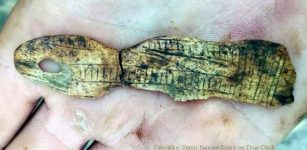 Prehistoric Sime Skeleton And Now 15,000-Year-Old Bone Pendant Depicting ‘Venus’ Found In Vlakno Cave, Croatia
Archaeology | Dec 4, 2017
Prehistoric Sime Skeleton And Now 15,000-Year-Old Bone Pendant Depicting ‘Venus’ Found In Vlakno Cave, Croatia
Archaeology | Dec 4, 2017 -
 Controversial Sand Mounds In Australia Are 6,000 Years Old Man-Made Burial Mounds – Radar Scans Reveal
Archaeology | Feb 10, 2018
Controversial Sand Mounds In Australia Are 6,000 Years Old Man-Made Burial Mounds – Radar Scans Reveal
Archaeology | Feb 10, 2018 -
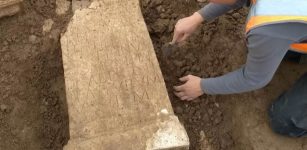 Amazing Discovery Of Ancient Roman Temple In The Netherlands Hailed As An Extraordinary Archaeological Find
Archaeology | Jun 20, 2022
Amazing Discovery Of Ancient Roman Temple In The Netherlands Hailed As An Extraordinary Archaeological Find
Archaeology | Jun 20, 2022 -
 4,500-Year-Old Row Of Giant Monoliths Found – Could Be the Largest In Britain
News | Sep 7, 2015
4,500-Year-Old Row Of Giant Monoliths Found – Could Be the Largest In Britain
News | Sep 7, 2015 -
 Curious Historical Observation Of A Bronze Age Warrior Who Shouldn’t Exist
Featured Stories | May 21, 2019
Curious Historical Observation Of A Bronze Age Warrior Who Shouldn’t Exist
Featured Stories | May 21, 2019 -
 Mystery Of The Candelabrum: One Of The Most Enigmatic Ancient Giant Ground Drawings In The World
Featured Stories | Nov 2, 2015
Mystery Of The Candelabrum: One Of The Most Enigmatic Ancient Giant Ground Drawings In The World
Featured Stories | Nov 2, 2015 -
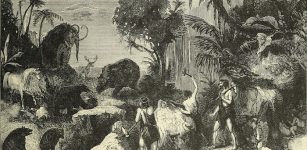 Ancient Human Feeding Behavior Studied By Scientists
Archaeology | Jan 18, 2022
Ancient Human Feeding Behavior Studied By Scientists
Archaeology | Jan 18, 2022 -
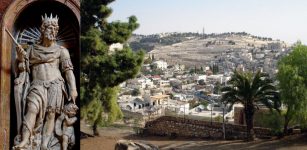 The City Of David – Why Is It So Controversial?
Biblical Mysteries | Jan 9, 2019
The City Of David – Why Is It So Controversial?
Biblical Mysteries | Jan 9, 2019 -
 Very Rare Ancient Roman Horse Brooch Discovered In UK
Archaeology | Mar 7, 2020
Very Rare Ancient Roman Horse Brooch Discovered In UK
Archaeology | Mar 7, 2020 -
 Remains Of Medieval Port Discovered In Eindhoven
Archaeology | Nov 17, 2020
Remains Of Medieval Port Discovered In Eindhoven
Archaeology | Nov 17, 2020 -
 Secret Ancient Knowledge Of The Druids And The Mystery Of The Missing Library Of Iona
Artifacts | Sep 4, 2016
Secret Ancient Knowledge Of The Druids And The Mystery Of The Missing Library Of Iona
Artifacts | Sep 4, 2016 -
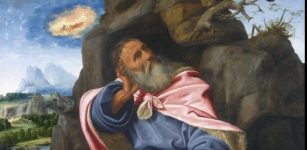 Raven: Uncommonly Intelligent Bird, Symbol Of Providence, Wisdom And Prophecy
Ancient Symbols | Feb 25, 2019
Raven: Uncommonly Intelligent Bird, Symbol Of Providence, Wisdom And Prophecy
Ancient Symbols | Feb 25, 2019 -
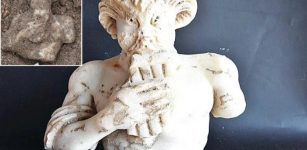 1,700-Year-Old Statue OF Greek God Pan Unearthed In Istanbul
Archaeology | Jun 9, 2023
1,700-Year-Old Statue OF Greek God Pan Unearthed In Istanbul
Archaeology | Jun 9, 2023 -
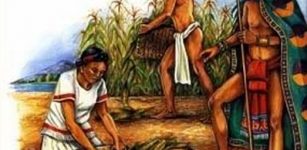 Slaves In The Aztec Empire Had Much Better Rights Than In Any Other Ancient Society
Ancient History Facts | Jul 6, 2016
Slaves In The Aztec Empire Had Much Better Rights Than In Any Other Ancient Society
Ancient History Facts | Jul 6, 2016 -
 On This Day In History: Father Of Nation Mahatma Gandhi Was Born – On Oct 2, 1869
News | Oct 2, 2016
On This Day In History: Father Of Nation Mahatma Gandhi Was Born – On Oct 2, 1869
News | Oct 2, 2016 -
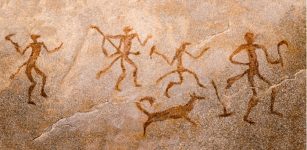 Hunter-Gatherer Genes Helped Early European Farmers Survive Disease – New Study
Archaeology | Mar 24, 2023
Hunter-Gatherer Genes Helped Early European Farmers Survive Disease – New Study
Archaeology | Mar 24, 2023 -
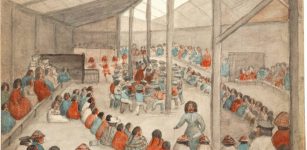 Potlatch: Ancient North American Indian Tradition Of Very Generous Gift Giving
Ancient Traditions And Customs | Sep 12, 2016
Potlatch: Ancient North American Indian Tradition Of Very Generous Gift Giving
Ancient Traditions And Customs | Sep 12, 2016 -
 On This Day In History: Dryburgh Abbey One Of Most Beautiful Of All Border Abbeys Of Scotland Founded – On Nov 10, 1150
News | Nov 10, 2016
On This Day In History: Dryburgh Abbey One Of Most Beautiful Of All Border Abbeys Of Scotland Founded – On Nov 10, 1150
News | Nov 10, 2016 -
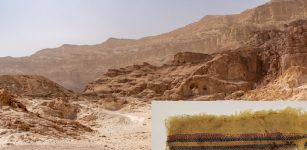 Has An Unknown Ancient ‘Israel Silk Road’ Been Discovered?
Archaeology | Jan 20, 2023
Has An Unknown Ancient ‘Israel Silk Road’ Been Discovered?
Archaeology | Jan 20, 2023 -
 Mama Quilla – Incan Moon Goddess Of Marriage And Fertility Assisted By High Priestesses Of Qoricancha
Featured Stories | Jun 15, 2020
Mama Quilla – Incan Moon Goddess Of Marriage And Fertility Assisted By High Priestesses Of Qoricancha
Featured Stories | Jun 15, 2020

